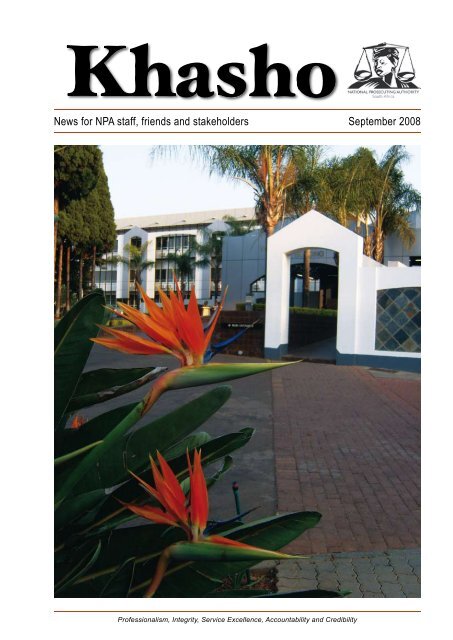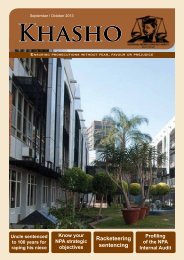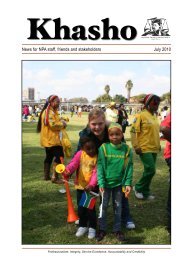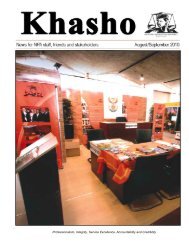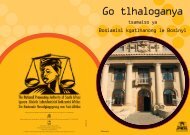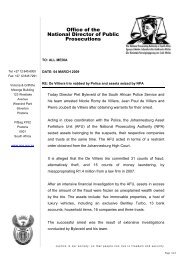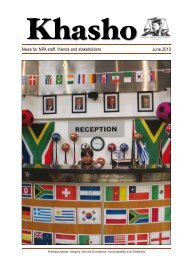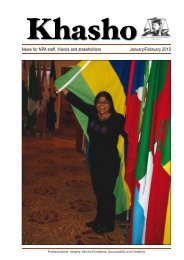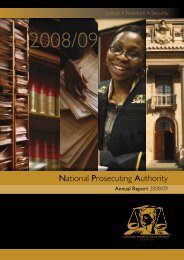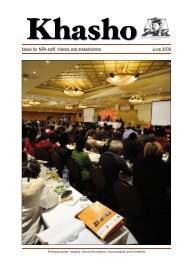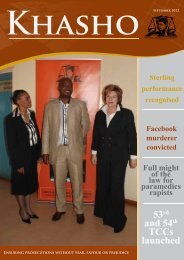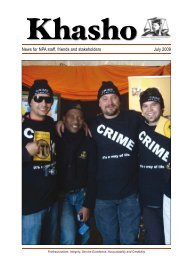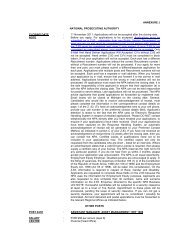Khasho September 2008 - National Prosecuting Authority
Khasho September 2008 - National Prosecuting Authority
Khasho September 2008 - National Prosecuting Authority
- No tags were found...
You also want an ePaper? Increase the reach of your titles
YUMPU automatically turns print PDFs into web optimized ePapers that Google loves.
News for NPA staff, friends and stakeholders <strong>September</strong> <strong>2008</strong>Professionalism, Integrity, Service Excellence, Accountability and Credibility
NPA NewsReflecting on the concept ofconstitutional democracy3Justice Johann van der WesthuizenJustice Johann van der Westhuizenof the Constitutional Courtprovided interesting insights intothe concept of constitutional democracyduring a prestige lecture delivered at theUniversity of Pretoria on 17 <strong>September</strong><strong>2008</strong> as part of the University’s centenarycelebrations. The event was attended by amost illustrious representation of the legalcommunity, including five judges of theConstitutional Court.Van der Westhuizen’s address reflected onthe role of courts, government, the legalprofession, universities, the media and civilsociety. With this lecture, he consideredaspects of the meaning of the conceptof constitutional democracy against thebackground of our apartheid history.In considering pre-constitutional SouthAfrica, Justice van der Westhuizencommented as follows: “In the absenceof a constitution as supreme law, thedilemma was, of course, where to find anyconcrete or more or less objective higherlaw or guiding principle to override unfairlaws – in natural law, international law, theprinciples of common law, the principlesof natural justice, or simply one’s ownsubjective views of fairness and justice.that guarantees the independence of courts,and requires the prosecuting authority toact without fear, favour or prejudice andprotects free expression as a basic right,”said Justice Van der Westhuizen.“The functions of the courts are clearlyset out in the Constitution,” he said. “TheConstitutional Court is the highest court inall constitutional matters and thus decidesappeals from other courts in disputesinvolving natural and juristic personsand the state, including criminal matters,provided that the matter is a constitutionalmatter or an issue connected with adecision on a constitutional matter.”He continued to focus on the importanceof the independence of the courts andthe separation of powers, referringto the role of various components ofsociety in our democratic order and theresponsibilities of judges and the courts,the government, legal practitioners,universities, the media and organisationsin civil society, including the right andduty to report, analyse, debate, commentand criticise.“In a democracy, views will inevitablydiffer,” said Van der Westhuizen.“Therefore, it could not possibly be saidthat judgments, the judiciary, courts, andeven the Constitution, are above criticism.”However, he concluded by remindingthe audience that “a democracy not onlyallows, but requires free expression andcriticism. But democracy is not necessarilythe natural state of humankind. It hasbeen hard-won, is precious and has oftenbeen easily lost. When it is destroyed, notonly will there be no right to criticise theConstitution and the courts; there will benothing left to criticise.”Justice Van der Westhuizen, who wasintimately involved in the drafting of theinterim constitution, as well as the 1996Constitution, joined the ConstitutionalCourt of South Africa in 2004. Hisjudgments have dealt with mattersranging from constitutional amendments,provincial boundaries and powers, fairtrial issues, equality, the development ofAfrican customary law, asset forfeiture,search and seizure procedures and theright to privacy.“Our present situation is very different.The Constitution resulted from the strugglefor democracy and was democraticallyagreed to by the representatives of the vastmajority of people.“We are now living in a constitutionaldemocracy, under a written ConstitutionDr JP (Torie) Pretorius, Deputy Director of Public Prosecutions (left), together withProf Johan Lötz of the Department of Mercantile Law of the University of Pretoria at theprestige lecture of Justice Johann van der Westhuizen.Professionalism, Integrity, Service Excellence, Accountability and Credibility
4Regional FocusDirectors-General in the JCPS Clustervisit the Eastern CapeThe Directors-General (DGs) ofthe Justice, Crime Prevention andSecurity (JCPS) Cluster held theirregular cluster meeting at the New LawCourts in Port Elizabeth on 2 <strong>September</strong><strong>2008</strong>. This formed part of their activitiesrelated to the ‘business unusual’ approachto improving service delivery to the citizensof the country. This was the third provincialvisit, following the visits to KwaZulu-Nataland the Western Cape. The aim is to ensuregreater insight into and synergy betweennational and provincial priorities.The visit was intended to give the DGsan opportunity to interact with theirprovincial colleagues andgain first-hand experience ofservice delivery at grassrootslevel. This kind of experiencewould prove invaluable inthe daily management of thedepartments that comprise theJCPS Cluster, in particular, andgovernment in general.The delegates were briefedby Commissioner MpumeleloLandu, Chairperson of theprovincial Joint Operationaland Intelligence Structure,comprising mainly membersof the South AfricanPolice Service (SAPS),the <strong>National</strong> IntelligenceAgency (NIA), the <strong>National</strong>Intelligence Coordinating Committee(NICOC), the NPA and theSouth African <strong>National</strong> Defence Force(SANDF). He reported on the generalsituation with regard to crime and theprogrammes launched to reduce crime inthe Eastern Cape. The DGs said that theywere encouraged by the drop in the overallcrime statistics in the province, particularlythose for contact crimes.However, it was worrying that the triocrimes (carjackings, business robberies andhouse robberies) had shown an increase.Commissioner Landu alluded to a numberof challenges, which included long remandsdue to full court rolls.The strategy adopted by the provinceto address crime includes establishinga provincial operational room using themethodology whereby crime intelligenceand case docket analysis are used to identifyand compile a list of active criminalsinvolved in trio crimes. A rapid responseunit and a tracing and investigation teamhave been established and significantbreakthroughs were made with ATMbombings and cash-in-transit robberies.It was notable that conviction rates indistrict courts were at 90%, those atregional courts were 58% and those at highcourts were 92%.The DGs of the JCPS Cluster came together in Port Elizabeth.The DGs also received a briefing fromMr Vuyani Mqulwana, Chairperson of theProvincial Integrated Justice DevelopmentCommittee. He provided a report on variousmilestones achieved by the developmentcommittee, such as the Child JusticeForum, the Restorative Justice Programme,the Case Backlog Project, the ForensicScience Laboratory in Port Elizabeth andthe Video Postponement Project. Withvideo postponement, an accused doesnot need to physically appear in court forthe postponement of a case. The systemallows the use of modern technology toset up ‘video-conference courts’ to remandaccused persons in criminal cases who arealready in custody awaiting trial.Apart from the regular meeting, the DGsalso visited the Nerina One-stop ChildJustice Centre in Shauderville, PortElizabeth. This centre is one of three childjustice centres in the country. The othertwo are in Mangaung (Free State) and PortNolloth (Northern Cape). Child justiceis an area in which partnerships withgovernment departments and civil societyare fundamental to the overall success ofthe strategy. These centres bear testimonyto the success government has achieved.The DGs paid a visit to the MotherwellPolice Station, which is adjacent tothe Motherwell Court. This indicatesgovernment’s commitment toimprove service delivery. Thestation commander briefed thegathering on the current stateof affairs.A media briefing was heldsoon afterwards, whereMr Ray Maqutyana, theprovincial chairperson of theCommunity Policing Forum,highlighted various initiativesbeing undertaken to ensure thesafety of the community andto win the fight against crime.He said that the partnershipbetween the police and thelocal communities was criticalin reducing the levels of crime.DGs who were present during this visitwere Advocate Menzi Simelane, (Justiceand Constitutional Development), CommissionerVernie Petersen (CorrectionalServices), Mr Mavuso Msimang (HomeAffairs), Advocate Mokotedi Mpshe(NPA), Mr Silumko Sokhupa (NICOC),Deputy <strong>National</strong> Commissioner AndrePruis (SAPS), Lieutenant-General TTMatanzima (SANDF), Provincial CommissionerMpumelelo Landu (SAPS),Mr Vuyani Mguqulwa (Chairperson ofthe Development Committee) and Mr JoeMatshapa (Chairperson of the MotherwellCommunity Policing Forum).Professionalism, Integrity, Service Excellence, Accountability and Credibility
8NPA NewsIntroducing lean thinkingThe lean thinking (process improvement) concept was adopted as a strategic initiative of the NPAand aims to develop systems and processes that will improve the operational performance of theorganisation.This initiative is part of the Operations Management Systems(OMS) strategic project. The project team comprises members ofthe <strong>National</strong> Prosecutions Service (NPS), Human ResourcesManagement and Development, the Programme ManagementOffice, Research and Policy Information, the Strategy Office anda few consultants.Originally an industrial concept from Japan (Toyota), lean thinkinghas been tried and proven to be effective in the workplace.Government departments have also introduced it and found it tobe effective. Organisations are encouraged to invest in a long-termcommitment as results cannot be achieved overnight. Dr AntonGrütter, coordinator of the Lean Project, says “speedy delivery isone of the primary concerns.” He also indicated that “the processis expected to undergo some up-and-down stages before reachingsuccess”.The Toyota thinking, as it is widely known, has been adopted bymany of the big organisations around the world, and its successdepends on the amount of buy in from the company. Some of thereasons why this initiative was incorporated into the existing OMSstrategic project are the following:• There is a lack of operations management understanding in theNPA.• The required operations management skill and knowledge is notin place.• There is a lack of integration and alignment between the processesof the NPA and those of other role-players in the criminal justicesystem.• Inefficient and ineffective processes that do not deliver thedesired results are prevalent.• There is a lack of a process improvement approach.• Limited understanding of the importance of processes to giveeffect to policy and regulations exists.• Existing NPA processes are not working optimally and in someinstances certain processes have not been implemented.The abovementioned factors result in poor service delivery andflawed process flows throughout the criminal justice system. A lotmore is attributed to lean thinking, but the following major principlesform the whole essence of this strategy:• Understanding what creates value for the customer• Eliminating tasks that do not add value because they are wastefuland time consuming• Making work flow through the process by removing obstacles• Involving front-line employees in the continuous improvementof the process• The project has identified two pilot sites: the Pinetown Magistrate’sCourt and the Recruitment section of Human ResourcesManagement and Development at Head Office. Steeringcommittees have been established at these sites to monitor theprogress and achievements of the lean implementation initiative.The steering committees are made up of representatives of thevarious role-players at each site.From research conducted at Pinetown, first-hand information flowof incidents of crime through investigation and court preparationwere documented and the collection of actual case procedures todetermine process inefficiencies were analysed.The Lean Thinking Project has been developed to establishsystems and processes to improve operational performance.The first set of information is based on the process flow map of actualtasks performed to ensure that improvement recommendations arebased on a realistic understanding of how the work on the criminaljustice system process actually takes place, while the second tracesthe root cause of court delays, wasted time and work effort.A study has been conducted on these sets of information and wassubmitted to local representatives early in June <strong>2008</strong>. The nextstep was that of information analysis and the identification of highleverage intervention points where waste can be eliminated. Smallteams were established by ‘process improvement’ champions totake ownership of the design and implementation of the identifiedactions required to improve workflow and processes within thecriminal justice system. The challenge facing these projects willbe to drive implementation of the improvement recommendationsthrough to completion where results would be measurable.Professionalism, Integrity, Service Excellence, Accountability and Credibility
NPA Uncovered9Apartheid heroesgiven proper farewellThe NPA Missing Persons’ Task Team conducts research and investigations into the tracing ofthe remains of persons who disappeared during the period of conflict covered by the Truth andReconciliation Committee (TRC). Ongoing investigations during the last year recovered the humanremains of 17 apartheid heroes from both formal burial sites and informal secret disposal sites.On 26 <strong>September</strong> <strong>2008</strong>, the remainsof some of the heroes killedduring the apartheid years werehanded to their families at Freedom Park.Dr Mochubela Seekoe, head of the TRC Unit(Department of Justice and ConstitutionalDevelopment), thanked the ambassador ofArgentina, Dr Carlos Sersale de Cerisano,who delivered a message of solidarity andacknowledged the fact that Argentine hadstarted a process of truth and reconciliationdue to the high rate of violence that ravagedthat country.Families of the departed heroes couldnot hold back their tears as Dr Seekoeannounced the names of the families whoshould come forward. The remains of thefollowing people have been found by theNPA Missing Persons’ Task Team:The Mamelodi Ten, student activists:Jeremiah Ntuli, Morris Nkabinde, JeremiahMagagula, Steven Makena, RooibaardGeldenhys, Samuel Masilela, ThomasPhiri, Elliot Sathege, Phillip Sibanyoni andAbram Makolane.The Nietverdient Four, MK operatives(only one was recovered):Duncan Molehe (MK Boitumelo).done yet, we would like the NPA to do morein recovering more bodies of our belovedbrothers and sisters.”“ We must engage ourgovernment in developinga policy that will guaranteethat our martyrs are givenstate funerals.”Mr Kebby Maphatsoe, from UmkhontoWesizwe Veterans’ Association (MKVA)and brother to Rev Maphatsoe, thankedthe NPA, Department of Justice andConstitutional Development (DJ&CD) andthe TRC for carrying out their mandate tofind struggle heroes. He indicated that thepresent government does not have a clearpolicy on the repatriation of the remains ofheroes killed during the struggle. Insteadindividual families must attempt to findtheir loved ones and bring them home. “Wemust engage our government in developinga policy that will guarantee that our martyrsare given state funerals,” he continued.“Today, we can move freely and enjoythe new dispensation because of thesepeople,” said Mr Maphatsoe. “Thesecomrades joined the ANC as individualswith nothing but passion for what theydid.” In his final words, Mr Maphatsoequoted the ANC manifesto and said “therecomes a time in a nation when its peaceand stability is threatened by externalforces and its only choice is to fight orsubmit”. This quote he equated to the factthat those struggle heroes had no choicebut to fight to bring stability and peace tothis country.The Missing Persons’ Task Teamcontinues to work in close conjunctionwith the TRC Unit in the DJ&CD andother state structures such as the SouthAfrican Heritage Resources Agency(SAHRA), the <strong>National</strong> Heritage Council(NHC) and Freedom Park Trust.Liaison with non-govermentalorganisations and victim organisationscontinues on a case-by-case basis to findthose who are lost.The Mmabatho Two, MK operatives:Petrus Ramodiehe Waisi (MK Dumakude)and David Takalani Nembaye (MK Madoda).The Zeerust Two, AZANLA combatants:Petrus Phaswane Masango and Petrus Mkobi.Humiliation and inhumane deaths were theonly experiences that these cadres enduredthroughout their ordeals. Jabu Shabangu(former AZANLA combatant) paid tributeto his comrades, and said: “The job is notThe families of apartheid heroes receive the remains of their loved ones.Professionalism, Integrity, Service Excellence, Accountability and Credibility
10NPA EventsCape Town hosts10 th IATSO conferenceOther NPA staff members helped to organise IATSO and tookpart in events and discussions. The Vice-Secretary-General ofIATSO is Advocate Dario Dosio, a regional magistrate with theDepartment of Justice and Constitutional Development.Some of the fascinating topics that were considered included thefollowing:This year, Cape Town was privileged to host the10 th International Association for the Treatment ofSexual Offenders (IATSO) conference from 27 to30 August <strong>2008</strong>. The main theme of this year’s conference wasPreventing sexual violence through effective sexual offendertreatment and public policy.IATSO was founded on 24 March 1998 in Caracas, Venezuela,during the 5 th International Conference on the Treatment ofSexual Offenders. It is an international non-profit organisationcommitted to the promotion of research into and the treatmentof sexual offenders throughout the world.IATSO believes that sexual offender treatment and researchare enhanced through international communication and theexchange of ideas, research and treatment methods. Sexualoffender treatment should be widely promoted, availableand accessible in order to reducethe incidence of sexual offences.Punishment for sexual crimes aloneis an inadequate deterrent for sexualcrimes. Sexual offender recidivism isbest reduced by treating the sexualoffender.• Sexual offender treatment: its scope, power and benefits forsociety• Working with children who are sexually aggressive: anoverview of policy and legislation supporting the treatment ofchildren• Reducing the risk of reoffending• Intermediary services for child witnesses testifying in criminalcourt proceedings in South Africa• How police interviewers can assist sexual offenders to provideaccounts• Childhood sexual abuse experiences of female student teachersin Zimbabwe• Personality characteristics of sexual offenders: how intractableare they?• Psychosomatics, dependency and sadism: chan ces andlimitations of forensic psychotherapy• The use of psychometrics for treatment planning of sexualoffenders in prison• Sexual homicide perpetrators: a comparison of child versusadult victims• Restorative justice as a challenge to traditional legal strategiesin sex offending casesAdvocate Thoko Majokweni, SpecialDirector of Public Prosecutions andHead of the NPA’s Sexual Offencesand Community Affairs (SOCA) Unit,Chairperson of the InterdepartmentalManagement Team (IDMT) andInnovations Ambassador, was thechairperson of the local organisingcommittee.IATSO specialisation focussed breakaway sessionProfessionalism, Integrity, Service Excellence, Accountability and Credibility
NPA Events11IATSO specialisation focussed breakaway sessionSpecific issues relevant to South Africa are the following:• The management of sexual offending in the context of highlevels of HIV infection• The impact of culture on sexual offending• The effectiveness of restorative justice programmes• The rehabilitation and treatment of young sexual offenders• Gangsterism and sexual violence• Human trafficking and sexual offending• Substance abuse and sexual offending• The impact of war on sexual violence• The use of pornography and sexual offending• The integration of offenders with the emphasis on prevention,reaction and support<strong>National</strong> and international delegates in the main Conferenceroom at IATSOPartners for this year’s IATSO conference included the NPA,the United Nations Children’s Fund (UNICEF), the Embassyof Denmark, Shoprite Checkers, Southern Sun, South AfricanAirways (SAA), the South African Human Rights Commission(SAHRC) and government in general.The purpose of hosting the conference in South Africa is toconsider new ways of implementing programmes that addresssexual offender therapy. The statutes and by-laws of IATSOsupport the development and improvement of effective sexualoffender treatment through international communication and theexchange of ideas, research and treatment methods.The next and 11 th IATSO conference will take place in Oslo,Norway, from 1 to 4 <strong>September</strong> 2010.NPA Risk and Secutiry Personnel, Shannon Randall, Samuel Mathoane,Macdonald Lucas, Rodney Bosman and Phulani Mashishi.Goals and objectivesof IATSO:• The sponsorship of biennial international conferenceson the treatment of sexual offenders forthe dissemination of new research, treatmentmethods, and to provide continuing educationand networking opportunities• The promotion of international, regional andlocal conferences on the treatment of sexualoffenders• Updating the IATSO standards of care for thetreatment of adult sexual offenders and theIATSO standards of care for the treatmentof juvenile sexual offenders, consistent withadvances in knowledge on the treatment ofsexual offenders• Advocacy of humane, dignified, comprehensive,ethical and effective treatment of sexualoffenders throughout the worldProfessionalism, Integrity, Service Excellence, Accountability and Credibility
12NPA EventsThe life of a regional communication managerThe NPA’s regional communication managers play an important role in promoting the image of theorganisation. <strong>Khasho</strong> spoke to Sandy Godlwana (SG), Lehuma Ntuane (LN), Tsepo Ndwalaza (TN),Khuselwa Rantjie (KR), Frank Lesenyego (FL), Medupe Simasiku (MS) and Natasha Ramkisson (NR)to gain some insight into this important function.Regional communicationmanagers (from left): TsepoNdwalaza, Medupe Simasiku,Sandy Godlwana, FrankLesenyego, Khuselwa Yonto,Natasha Ramkisson andLehuma NtuaneHow do you view your role as a regionalcommunication manager (RCM)?SG: It’s always great to transform adream into reality. I’m very passionateabout what I do, and my work is reallystimulating. I particularly enjoy the interactionwith internal and externalstakeholders. Challenging as this aspect ofmy job may be, it is one area I thrive in. I getso much fulfilment from having satisfiedstakeholders. At any given time of the weekand month, my work is synonymous withpressure. These are the times when one’sability to work and cope under pressure istested to the fullest (in terms of the media,for instance, journalists always have tightdeadlines, even if one is busy with otherwork, the media always manages to win).LN: My role in the region is to coordinatethe activities of the organisation and tocreate a presence and visibility of the NPAin the existing media platform, therebycreating positive media coverage.How have you found the work in yourregion so far?TN: People are beginning to understandour role and we are excited about theprogrammes that we are working on. I findmy work environment to be very positiveand I have received a lot of support frommy colleagues.KR: I find it hard sometimes to crack it: tomake people understand the impact of thework that I am doing or the importance ofutilising my service to maximise the impactof the work of the organisation.How do you distinguish between yourrole as a communicator and that ofother units/people in your region?FL: My role is to support the core functionof prosecutions by communicatinginformation that will assist the generalpublic in understanding the work of theNPA and in participating in preventing andcombating crime.MS: I have a personal work plan thatdistinguishes my role. However, there aretimes that I need support from colleagueslocally in terms of transport, photocopyingand many other administration functions,and they are always willing to help. Theroles are clear and easily distinguishable,especially those that need to be donecollectively with Human ResourceManagement and Development. At timesI receive calls from the media regarding acertain matter in court, and I need to linkthe media with the relevant prosecutor,or request the prosecutor to brief meaccordingly, thus enabling me to addressmedia queries on time.Do you think there’s any confusion aboutyour role?KR: I would not call it confusion, butcolleagues need to understand the workwe are doing, and that it entails muchmore than just issuing media statementsor sourcing venues for regional events. Iregard the input of an RCM as critical to thesuccess of an event: from the planning tothe implementation.SG: I was fortunate enough to have beenintroduced to colleagues at various meetingsby the Director of Public Prosecutions. Inone of the management meetings I wasrequested to make a presentation on whatI’d be doing in the region. In addition,a regional communication strategy waspresented to managers who, I assume,filtered that information to other colleaguesin the different clusters.Do you think it has made a differenceto have an RCM on the ground?NR: Yes, definitely. I may be biased, butI have received a lot of positive responsesfrom people in my region who support theidea of an RCM. They’ve said that it hasmade a huge difference. I think that we’veonly just started making a change, as there’sa lot more work to be done.continued on page 13Professionalism, Integrity, Service Excellence, Accountability and Credibility
NPA Events13Recruiting aspiring prosecutorsThe North West University invited the NPA to attend its career fairs that were held at its PotchefstroomCampus on 29 and 30 July <strong>2008</strong> and its Mafikeng Campus on 12 and 13 August <strong>2008</strong>.The fairs were attended bymembers of the NPA’s Departmentof Human Resources, inpartnership with the CommunicationsUnit and the <strong>National</strong> ProsecutionsService (NPS). The whole idea was tointroduce students to the NPA’s AspirantProsecutors Recruitment Programme,and to raise the profile of the NPA at thesame time.An advocate from Klerksdorp, AdvocateMark Adams, who is a tutor in thisprogramme, and two aspirant prosecutors,Orlinah Mputla and Shakeng Kutumela,were part of the team. They assistedin answering prosecutorial questionsthat were raised by the final-year lawstudents.Students were provided with informationand brochures, organised by all the units.Advocate Mark Adams, attending to studentsAlmost 300 students visited the NPAstall and asked questions that could besuccessfully answered. The studentscould also meet Advocate Adams and askhim any questions they might have.The career fair was very successful and awish was expressed that it be continuedto provide the NPA with an evengreater opportunity to recruit dedicatedprosecutors to fight crime successfully.continued from page 12TN: I believe my work has made a differencebecause some of my colleagues in the regionhave said so. I am also hoping that as timemoves on there will be more visible changesin terms of how the things we do impact oncommunication in the organisation.What are the highlights of your work?LN: Developing a positive media responseto activities we have had over the past fourmonths and ensuring NPA participation incluster and relevant provincial governmentevents.NR: There have been many highlights, butI think what I have found most pleasinghas been the warm response and support Ihave received from the staff in my region.They’ve been very accommodating andreceptive to me.What do you still hope to achieve?FL: To work closely with media institutionsto promote and brand our organisation.I am also participating in public awarenesscampaigns to get the general public tounderstand the function of the NPA inorder to contribute to an improved criminaljustice system.SG: I still get a sense that many people incommunities don’t understand what the NPAdoes, especially people from disadvantagedcommunities. We have exhibitions andcareer fairs at universities and presentconferences, but it’s also important thatcommunities benefit from our services. Wehave already started doing this by way ofcommunity outreach programmes that havebeen very successful.Of all the projects you have been involvedin, which one do you consider to havebeen an eye-opener and why?KR: Before joining the NPA, I never knewof the existence of the Sexual Offencesand Community Affairs Unit, and for methe service that is provided by the unit isvery critical to our communities. Moreimportantly, we need to raise an awarenessof the approach that is taken in terms ofensuring that communities are made awareof the risk factors and are able to takepreventative measures.MS: An eye-opener for me was theBethlehem Blanket Donation Project fororphaned children. One could actually tellthat the children were there as a result ofsome form of crime. Some of them areorphaned as a result of HIV/Aids, and inmany instances also as a result of rape.This made me realise that the role of aprosecutor is really that of a people’slawyer. In other words, prosecutors arenot only involved in courts and fightingcrime; they are involved in partnershipswith the community, and are accountableto the citizens in the specific areas in whichthey serve. I realised how important it isto raise the awareness of the communityabout the important role of prosecutors insociety.Professionalism, Integrity, Service Excellence, Accountability and Credibility
14 Staff NewsImportant implications of the Public Service Amendment Acton labour relations processesA previous <strong>Khasho</strong> article briefly covered the amendments to the Public Service Act and theirintended effect on certain aspects of labour relations. At the time of the publication of that article,the Public Service Amendment Act had not yet come into operation. The final version of the PublicService Amendment Act (Public Service Act 103 of 1994, as amended by Act 30 of 2007) has sincebeen promulgated. This article aims to emphasise the important aspects of the act as it relates tolabour relations matters.Anumber of changes have beenapplied to the Public ServiceAmendment Act to strengthen theorganisational and human resource pillarsof the public service to enhance internalefficiency and service delivery.Firstly, the anomaly that existed betweenthe Public Service Act, which gave only thehead of department the power to dismiss,and the Disciplinary Code and Procedurefor the Public Service, which gave thechairperson of a disciplinary enquiry thepower to impose sanctions, have beenremedied (section 16B(1)). The currentstatus is that all sanctions pronounced bythe chairperson must be implemented bythe head of department.Many of us are familiar with situationswhere employees tender resignations inthe light of pending disciplinary enquiries,only to find that they have subsequentlyfound employment in other governmentdepartments or in other regions of thesame department. There was a greatdeal of uncertainty about whether or nota department could pursue disciplinaryaction against employees once they hadleft. The Public Service Amendment Acthas now clarified this issue by expresslyproviding for the commencement orcontinuation of a disciplinary hearing bythe new department (section16B(4)).Another point on the issue of resignationsis that even though an employer cannotrefuse to accept a resignation, the employercan refuse to accept a period of noticethat is shorter than the prescribed period(section 16B(6)). This means that a 30-daynotice period must be enforced and cannotbe deviated from if notice of a disciplinaryhearing has been served on an employee.The strong stance taken by the publicservice towards transgressing employeesis further emphasised through the inclusionof the provision for the prohibition of there-employment of employees dismissedfor certain kinds of misconduct (section17(4)). However, it should be noted thatdifferent periods for re-employment maybe prescribed by way of regulations fordifferent transgressions.During the past few years, the public servicehas been inundated with unfair labourpractice disputes resulting from the failureto promote internal candidates (publicservice employees). Although certaindepartments have tried to argue that suchcases would amount to appointments andnot promotions, the courts did not agree.A well-known case in this regard was Jelevs the Premier of KwaZulu-Natal andothers, where the Labour Court rejected theDepartment of Transport’s argument thatthe application for the position in questionwould have amounted to an appointmentand not a promotion. Arguments ofappointment versus promotion were furtherhampered by the terminology expressed inthe Public Service Act. In terms of the act,if a government employee applied for ahigher post in the public service and wassuccessful, he/she was regarded as havingbeen promoted. The act has been amendedto limit such disputes by omitting anyreferences that were previously made topromotion (section 9). This is intended toplace both internal and external candidatesin the same position (neither may declareunfair labour practice disputes). No courtdecision has been delivered on this issuesince the implementation of the PublicService Amendment Act, but it will bemonitored closely.A few additional issues worth mentioningin respect of the Public Service AmendmentAct is that it empowers the Minister ofPublic Service and Administration tomake regulations on the powers of thechairpersons of disciplinary hearings tosummon employees and other persons,administer oaths, examine witnessesand call for the production of books anddocuments (section 16B(3)). Furthermore,section 17(2) of the Public Service Act,which provided for various grounds ofdismissal, including misconduct, ill-health,the abolition of posts, misrepresentation,etc, has been replaced by grounds ofdismissal that are in line with the groundsas specified in the Labour Relations Act.The Public Service Amendment Act,which has the intention of reinforcingthe supremacy of collective agreements,also aims to enhance its implementationand compliance by implementing theseagreements by means of ministerialdeterminations (section 5(6)).In order to ensure that the objectives ofthe Public Service Amendment Act areachieved, comprehensive provisions havebeen made for the delegation of functionsvested in executive authorities and headsof department (section 42A).It is trusted that the above informationwill assist employees in understandingsome of the important implications of thePublic Service Amendment Act and that,in turn, all employees – and especiallymanagement – will help to ensurethat these amendments are correctlyapplied and utilised by the NPA, therebyimproving the management of disciplineand other labour relations and humanresource processes.Professionalism, Integrity, Service Excellence, Accountability and Credibility
NPA People15A healthy mindand a healthy bodyOn 21 and 22 August <strong>2008</strong> the Employee Wellness Programme (EWP) held a regional coordinators’work session at the VGM Building to present its annual plan and to explore its implementation in allregions and business units.The two-day work session was anopportunity to reflect on its 2007/08annual report, and also provided theopportunity to market EWP services andgain support for its activities.After the words of welcome byRomeo Adams, Executive Manager:Human Resource Management andDevelopment, Ms Kathy Berman ofQuantum Space Wellness (QSW), theEWP service provider, presented theannual report, which reflected on thecounselling service utilisation rate andvarious workshops conducted in all theregions. This presentation provided anopportunity to reflect on the effectivenessof the EWP and the achievements andprogress that have been made.“Health is a state ofcomplete physical,mental and socialwellbeing, andnot merely theabsence of diseaseor infirmity.”~World Health Organization, 1948Ms Nsovo Shirilele of the EWP Divisionpresented the <strong>2008</strong>/09 plan to the regionalcoordinators. The purpose of this was tomake them aware of the objectives of theplan, as well as the activities to be carriedout in order to achieve these objectives.The annual plan also focused on variousRegional representatives reaffirmed their commitment to employee wellness.wellness activities that can assist inenhancing the success of the activities ofthe EWP Division.Ms Eunice Potsane, a QSW representativefrom Khanya Family Centre, a serviceprovider rendering HIV/Aids workshopsfor NPA employees, reflected on thebenefits of HIV/Aids workshops andthe challenges encountered during visitsin the different regions. These includepeople’s attitudes and perceptions ofHIV/Aids workshops, poor attendanceand lack of interest from NPA employees,no access to the NPA intranet and lack ofawareness of the NPA’s HIV/Aids policy.She also gave a brief presentation onthe content of the HIV/Aids workshopprogramme.In conclusion, all EWP regionalrepresentatives made a pledge reaffirmingtheir commitment to pool their resourcesin the fight against HIV and to deal withHIV/Aids in a professional manner. Therole of regional representatives is to assistwith the promotion and marketing of theEWP, to increase awareness nationallyand to establish and maintain internal andexternal relationships. Services offeredby the EWP Division are telephone andface-to-face counselling, preventativeand information work sessions (on stressmanagement, healthy lifestyles, traumamanagement, etc), HIV/Aids workplaceprogrammes (voluntary counselling andtesting, and care and support programmes)and health promotion (general healthscreening and the dissemination of healthand wellness information).The toll-free EWP telephoniccounselling number is:0800 239 355.Professionalism, Integrity, Service Excellence, Accountability and Credibility
16Staff NewsSecretaries’ Day at the NPANew appointmentsAsset Forfeiture Unit• Colleen Louise Brown (Pretoria),Cecilia Smit (Far North), FrederickMxolisi Ndlovu (Durban), RoselineDumi Sejeng, Willem Petrus Venter,Philip Gerald Claassen (Johannesburg):senior special invesigators<strong>National</strong> Prosecutions Service• Sinothile Purity Msomi: Manager: CourtPreparationDirector of Public ProsecutionsSecretaries at the NPA celebrated their special day in style at Mbokoto Lodge inPretoria East on 3 <strong>September</strong> <strong>2008</strong>. They were treated to a scrumptious lunch and werepampered with attention and massages. Both the secretaries and their managers werewelcomed by the Acting CEO, Dr Khotso de Wee. Dr De Wee commented that busymanagers don’t normally give secretaries dedicated attention and that Secretaries’Day helps to cover some neglect suffered by secretaries during the rest of the year.The speaker of the day, Advocate Mokotedi Mpshe, Acting <strong>National</strong> Director of PublicProsecutions, regards secretaries as valuable members of the NPA. Advocate Mpsheindicated that every organisation has a vision and a mission, and that secretariesare there to assist managers to ensure that this vision and mission are met. He alsoencouraged secretaries to broaden their horizons and to strive to achieve new goals.Lilly Nkgapele, the chief organiser of the event, thanked management for acknowledgingtheir secretaries and allowing them to enjoy their special day in style.Spring has sprungSpring Day is a day marking the comingof spring, which takes place ondifferent dates in different countries.In South Africa, it is celebrated on1 <strong>September</strong> every year. Usuallypeople exchange flowers andwear colourful clothing. At theNPA, staff at the VGM Buildingcelebrated Spring Day on1 <strong>September</strong> with beautiful flowers:roses, gerberas and carnations.• Deborah Edith Zinn (Pietermaritzburg):junior state advocateChief Public Prosecutor• Kameshnee Sewnarain (Port Shepstone),Boy Steven Mongwe (Mmabatho):advanced district court prosecutorsHuman Resource Development:Head Office• Cheryl le Roux: Human ResourcesManagerPromotionsChief Public Prosecutor• Irene Malitsha (Thohoyandou): regionalcourt prosecutor• Constance Gasealolwe Louw (Bethlehem):district court control prosecutorSpecialised Commercial Crimes Unit• Maria Naomi Humphreys: SeniorDeputy Director of Public Prosecutions• Mamodise Magaret Thulare: senior stateadvocateYourActionCOUNTSSend your news (serious and funny)and letters to khasho@npa.gov.za.Alternatively, fax your stories andinformation to 012 843 2141.Publishing Editor: Janet de Jager,NPA Communications UnitPublication management, sub-editing,layout and design: Janine Smit EditorialServices: www.jses.co.za.Professionalism, Integrity, Service Excellence, Accountability and Credibility


